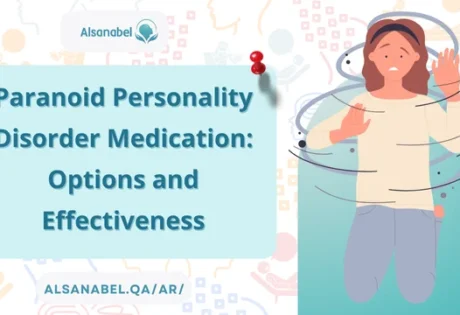
Borderline Personality Disorder (BPD) is a complex mental health condition characterized by intense emotions, unstable relationships, impulsive behaviors, and an overarching difficulty with emotional regulation. For those living with BPD, the challenges can often feel overwhelming, but it is essential to recognize that effective treatments and coping strategies are available. Learning how to get rid of borderline personality disorder involves understanding the therapeutic options and adopting a holistic approach to mental well-being.
In this article, we will explore the best treatments for BPD, including various therapeutic methods, as well as the role of medications for symptoms. Additionally, we will provide practical tips for managing the condition and enhancing emotional stability.
Understanding the Treatment Options for BPD
Addressing BPD requires a multi-faceted approach that combines therapy, medication, and personal efforts. The goal of treatment is not only to alleviate symptoms but also to empower individuals with the skills to manage their emotions and improve their quality of life.

Therapeutic Approaches to BPD
Therapy is often the cornerstone of treatment for BPD, as it helps individuals understand their emotions, behaviors, and relationships more effectively.
Dialectical Behavior Therapy (DBT)
- What It Is
- DBT is a specialized form of therapy designed specifically for BPD. It focuses on teaching skills for emotional regulation, distress tolerance, interpersonal effectiveness, and mindfulness.
- Why It Works
- By targeting the specific struggles faced by individuals with BPD, it helps reduce self-destructive behaviors and improve emotional control over time.
- Long-Term Benefits
- Participants often experience enhanced self-awareness, better relationships, and reduced impulsivity.
Cognitive Behavioral Therapy (CBT)
- How It Helps
- CBT focuses on identifying and changing negative thought patterns that contribute to emotional instability and maladaptive behaviors.
- Areas of Impact
- It is particularly effective for addressing impulsivity, distorted perceptions, and black-and-white thinking.
- Customized Plans
- It can be tailored to address specific triggers, making it a flexible option for treating BPD.
Psychotherapy
- Broad Focus
- Traditional psychotherapy explores past experiences, unresolved trauma, and relationship dynamics to provide a deeper understanding of emotional challenges.
- Supportive Framework
- It creates a safe environment where individuals can process their feelings and develop healthier coping mechanisms.
The Role of Medications in Treating BPD
Although therapy remains the primary treatment, medications for symptoms can be an essential component of a comprehensive plan.
Medications Used in BPD Treatment
- Mood Stabilizers
- Help regulate intense mood swings and reduce emotional reactivity.
- Antidepressants
- Address co-occurring symptoms such as anxiety and depression.
- Antipsychotics
- May be prescribed for individuals experiencing severe emotional dysregulation or paranoia.
- Limitations
- Medications are not a cure for BPD but can be effective in managing specific symptoms when combined with therapy.
Lifestyle Adjustments for Managing BPD
Treatment extends beyond clinical interventions; adopting lifestyle changes can significantly enhance emotional stability and overall well-being.
Effective Lifestyle Strategies
- Mindfulness Practices
- Techniques like meditation, yoga, and deep breathing improve self-awareness and reduce stress.
- Regular Exercise
- Physical activity releases endorphins, helping to regulate mood and reduce anxiety.
- Healthy Diet
- A balanced diet supports brain health and emotional resilience.
- Stable Routine
- Maintaining a consistent daily schedule helps minimize feelings of chaos and uncertainty.
Tips for Coping with BPD
While professional treatment at Al Sanabel Specialized Psychiatric Center In Qatar is essential, there are practical strategies individuals can implement to navigate the challenges of BPD more effectively.
Daily Coping Techniques
- Journaling
- Writing down thoughts and feelings can provide clarity and a sense of control over emotions.
- Building a Support Network
- Surrounding oneself with understanding and compassionate individuals creates a safety net during difficult times.
- Learning Triggers
- Identifying and avoiding emotional triggers helps prevent episodes of intense distress.
- Practicing Self-Compassion
- Acknowledging progress and avoiding self-criticism fosters a positive outlook.
Answering Key Questions About Treating BPD

1. What are the best treatments for borderline personality disorder?
The best treatments for BPD include a combination of DBT, CBT, psychotherapy, and medications when necessary. These approaches help address emotional dysregulation, impulsivity, and relationship difficulties effectively.
2. Can borderline personality disorder be completely cured?
While there is no definitive cure for BPD, symptoms can be managed to the point where individuals lead fulfilling and stable lives. Long-term therapy and personal commitment are crucial for sustained improvement.
3. What role does therapy play in treating BPD?
Therapy is the cornerstone of BPD treatment. Techniques like DBT and CBT equip individuals with the skills to regulate emotions, manage relationships, and reduce harmful behaviors.
4. Are medications effective in managing borderline personality disorder?
Yes, medications can help manage specific symptoms of BPD, such as mood swings, anxiety, and depression. However, they are most effective when used alongside therapy.
5. What are the tips for coping with borderline personality disorder?
Practical tips include journaling, building a support network, identifying triggers, practicing mindfulness, and making healthy lifestyle choices to promote emotional stability.
Understanding how to get rid of borderline personality disorder involves embracing a multifaceted treatment approach that combines professional interventions, lifestyle changes, and personal commitment. From the transformative benefits of DBT and CBT to the supportive role of medications for symptoms, each component plays a vital role in helping individuals regain control over their lives.
By prioritizing consistent effort and seeking support, individuals with BPD can build healthier relationships, improve emotional regulation, and lead fulfilling lives. Whether through therapy, lifestyle changes, or a combination of both, hope and recovery are achievable for anyone facing the challenges of BPD.

